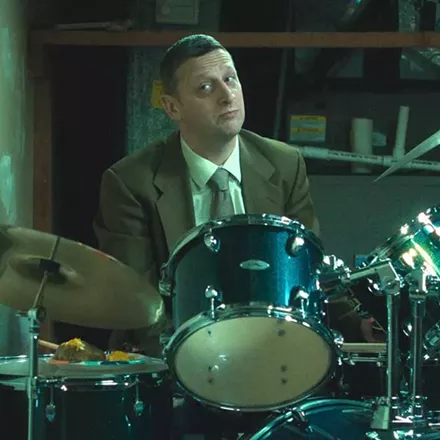Think back to any disaster film you have ever seen. Recall the moment (they all have it) when the hero storms into some room, unbidden, to warn of an impending apocalypse (a volcano is about to erupt! Dinosaurs are about to escape! Tidal wave! Aliens!). Recall how the hero is ignored.
Fast-forward in your mind to the point when the apocalypse arrives. There is almost always a moment when one of the apocalypse deniers (smoking a cigar, or on the toilet, always unaware) turns around, or looks up, to see a literal or figurative tidal wave bearing down. The cigar falls out of his mouth and doom rains down, end scene.
Margin Call, which concerns the collapse of the housing bubble as seen from inside one incredibly bubbled firm, is every bit a disaster film. When Peter Sullivan (Zachary Quinto) — a risk analyst and the closest thing we get to a hero — barges in to warn of the market’s implosion, though, the tidal wave has already crashed.
His bosses ask if they are underwater. He replies that not only is Wall Street underwater, everyone has already drowned.
It’s a testament to what a theoretical and poorly understood house of cards the market is that an apocalypse like the crash of 2008 could loom on the horizon yet go unnoticed for weeks. The watchmen were the complicated formulas that calculate risk at massive firms like Lehman Brothers and others that bet hard on bad mortgages.
Firms created these formulas based on certain historical market conditions and within those conditions, the formulas work fine — people make billions, trillions of dollars. When the market experiences something that has never happened before, though, the formulas stop working.
Worse, the formulas don’t even realize there is a problem, because the problem exists outside the range of what they’ve been created to look for.
It takes a person — here, Quinto — to notice the problem. By the time he does, everyone is pretty much dead.
First-time writer/director J.C. Chandor does an excellent job of wringing not just drama, but suspense from hushed office patter. He does an even better job of simplifying incredibly complex things (like the math that created the bubble, then popped it) into simpler concepts.
These simpler concepts perhaps don’t tell the whole story, but they make the moral clear as day: America asked for massive economic growth forever, and Wall Street tried to oblige. They nailed the massive part, but the forever part is impossible.
In 2008, the market crashed because it had to.
Chandor’s triumph (and this film is every bit a triumph) isn’t just moral. It’s also personal. We only get small snippets of these various men (and one woman) as they go about figuring out how to stave off crisis, and the motives of each is strikingly human.
Penn Badgely (Gossip Girl) plays the youngest associate, ever consumed with how much his superiors make, as though that is all that matters. Kevin Spacey plays the film’s erstwhile conscience, though the objections he raises aren’t for the common good, they’re for the principles of sales. You sell somebody a shit product, he warns, they’ll never buy from you again.
Each person in Margin Call is guilty of incredible self-obsession and greed and power-lust and catastrophic shortsightedness, but all that stops short of outright evil.
And while they decide to save themselves while holding the rest of our heads under water, Chandor’s remarkable evenhandedness paints this not as a monstrous villainy, but a thoroughly human act of self-interest.
The excesses of the market and its myopia mirror the people and the society that built it. Like it or not, its corruption is our own.




















